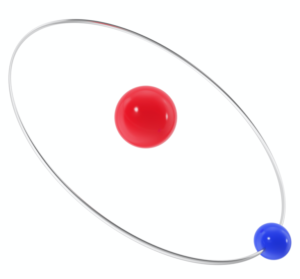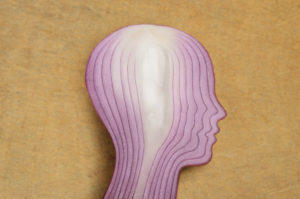Are you an Onion or a Hydrogen Atom?
-

Every hydrogen atom on Earth is exactly the same as every other hydrogen atom on Earth and the same as those hydrogen atoms 20 million years ago. Each atom has the same number of electrons, the same atomic weight, and so on. Humans cannot be described this way. You could randomly choose 1 million people across Earth and sort them on any given number of characteristics (hair color, personality, tooth decay – does not matter); you will never get two people with the exact same level of characteristics.
Shrek, yea that Shrek – the one we all love so dearly, describes ogres as onions – “Onions have layers. Ogres have layers.” You want others to understand that you are not a simple person that can be described with convenient labels (even though we try!). There is more to you than just being a mother or a sports fan or an introvert.

You would never describe yourself in such extreme language. Do you make your bed in the morning? Yes or No? This is an impossible question to answer because you never make your bed every single day. Are you extraverted? Yes or No? How can you answer this question without stretching the truth?
Let me explain using an example. Conscientiousness is defined by paying attention to detail, planning ahead, following rules, tidiness, and meeting deadlines. I consider myself to be very conscientious. I do make my bed most mornings, clean the dishes and kitchen every night and pick up in the living room. My car is always immaculate, because I never know when I will need to give someone a ride. Yet, my office is a wreck! I have books and papers stacked haphazardly and my file drawer is not very organized. I pay close attention to detail and make few errors on projects. However, that attention to detail and quest for perfection means that I often miss deadlines or am late on completing projects! Therefore, I can’t say that I am conscientious in an absolute sense. Comparatively, I am more conscientious than not and probably more so than most other people. But, it depends on other factors:
- Time: Some times of the year I have more demands than I can handle, so deadlines get missed.
- Situation: I keep the kitchen, living room, and my car clean but not the master bedroom or the garage or my home office.
- Motivation: Some projects are simply not that interesting. I don’t like scrubbing the shower, no one will see my messy garage, and I am more willing to meet deadlines and pay attention to detail when I work with others who do the same.
 Why limit yourself? Although we use convenient categories to describe other people, we would never describe ourselves using stark categories. Why not? Because we do not like being put into a box. We know that when describing our attitudes, behaviors, and values “it depends…” It depends on the circumstances, our stage in life, and there are countless other differences that explain our behavior. The variability in human behavior is truly staggering. Although we would like the world to work as right or wrong, up or down, it simply does not work that way. If someone asks if I make my bed every morning, I cannot say “yes” or “no”. Most days I make my bed but on many days I do not. What does it all mean? Most companies use personality for prehire selection or leader development and nearly all companies do employment attitude surveys. Are you using a personality measure with a simple yes/no or true/false response option? If so, then those personality measures do not match the reality of human behavior. People are better at making comparative or relative judgments than absolute judgements. Asking consumers if Coca-Cola is sweet is problematic because how sweet is sweet? In contrast, if you ask consumers to rate the sweetness of several soft drinks then they can apply the same criteria across them and judgments are more reliable. The same applies to measuring attitudes, values, and behaviors. It is easier for people to judge the relative degree to which they enjoy yoga on a gradient rather than simply asking if yoga is enjoyable (yes/no). Because of this, we argue that the use of absolute rating scales should be avoided when measuring personality. The world is not black and white so why should we force people to make a choice? The solution: Use a measure of personality with a gradient. Consider an item that measures extraversion. There are two different response options and you are to circle the response option which best represents your behavior. Which of the following items is more desirable?
Why limit yourself? Although we use convenient categories to describe other people, we would never describe ourselves using stark categories. Why not? Because we do not like being put into a box. We know that when describing our attitudes, behaviors, and values “it depends…” It depends on the circumstances, our stage in life, and there are countless other differences that explain our behavior. The variability in human behavior is truly staggering. Although we would like the world to work as right or wrong, up or down, it simply does not work that way. If someone asks if I make my bed every morning, I cannot say “yes” or “no”. Most days I make my bed but on many days I do not. What does it all mean? Most companies use personality for prehire selection or leader development and nearly all companies do employment attitude surveys. Are you using a personality measure with a simple yes/no or true/false response option? If so, then those personality measures do not match the reality of human behavior. People are better at making comparative or relative judgments than absolute judgements. Asking consumers if Coca-Cola is sweet is problematic because how sweet is sweet? In contrast, if you ask consumers to rate the sweetness of several soft drinks then they can apply the same criteria across them and judgments are more reliable. The same applies to measuring attitudes, values, and behaviors. It is easier for people to judge the relative degree to which they enjoy yoga on a gradient rather than simply asking if yoga is enjoyable (yes/no). Because of this, we argue that the use of absolute rating scales should be avoided when measuring personality. The world is not black and white so why should we force people to make a choice? The solution: Use a measure of personality with a gradient. Consider an item that measures extraversion. There are two different response options and you are to circle the response option which best represents your behavior. Which of the following items is more desirable? The true/false dichotomy does not reflect reality. This is an absolute. Instead – you want measures that capture the nuances of our personality. You may not always feel like being the life of the party, and if not, why should you be forced to select the word “true”? There are personality assessments that use relative rating scales that better match the real world. Click the AOE-P image below to try out a demo:
The true/false dichotomy does not reflect reality. This is an absolute. Instead – you want measures that capture the nuances of our personality. You may not always feel like being the life of the party, and if not, why should you be forced to select the word “true”? There are personality assessments that use relative rating scales that better match the real world. Click the AOE-P image below to try out a demo:
Click above to try out a scientifically valid personality tool